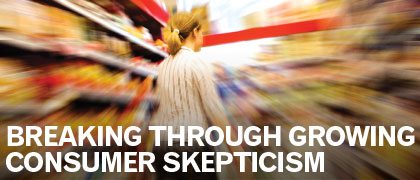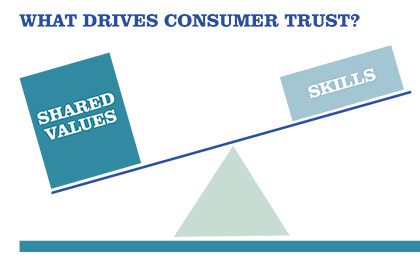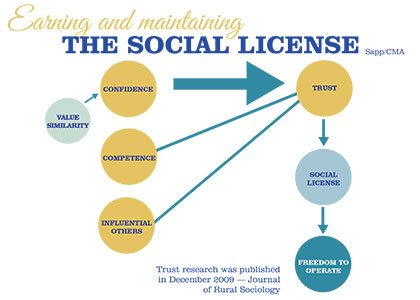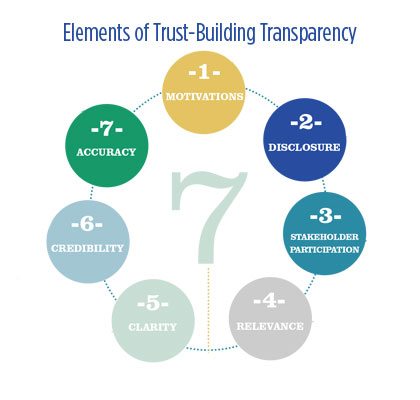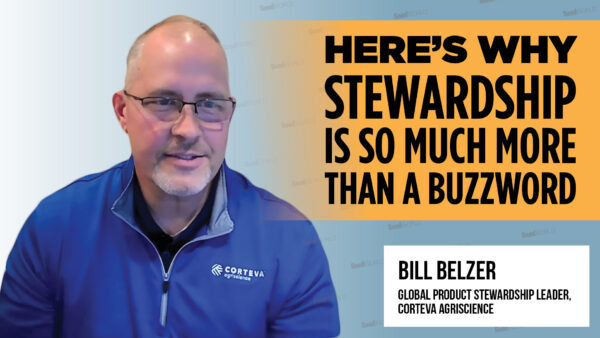New Research Offers Roadmap for Trust-Building Transparency
Now more than ever, consumers are asking questions about farming and food. What is the role of technology and innovation? How do I know the food I’m consuming is safe? Are farmers and food companies putting profits ahead of public interest?
Mistrust is the norm and global issues loom large—resource scarcity and waste, food security and global trade, among others. Consumers are particularly leery of large companies, believing that mass production creates more opportunity for error, that industrialized food production is inherently impersonal, and that big companies will put profits ahead of public interest.
Today’s skeptical consumer simply wants authentic transparency—and to know that companies share their values. That’s reflected in our long-term research and emphasized in our early 2013 focus groups conducted in Los Angeles, Boston and Minneapolis where we asked participants specifically about biotechnology.
After learning that genetically modified foods have been on grocery store shelves for nearly two decades, a woman from Los Angeles responded, “This is beyond scary to me. I feel like I’ve been deceived. Why weren’t they providing more information all along about what I’m eating?”
Charlie Arnot, CEO of The Center for Food Integrity
Her comment is not unusual. Today’s environment is one where shoppers face more angst in the aisles—fretting over how to spend their food dollars. Which foods have been genetically modified? Is organic safer and healthier than conventionally raised food? Should I buy foods with ingredients I can’t pronounce?
We see consumer alienation from agriculture and the food system expressed through concerns about nutrition, food safety, affordability, environmental sustainability, wellbeing and other issues.
The stakes are higher than ever before, even though some argue that building and maintaining public trust is a worthy goal, but not relevant to success in business.
This outdated notion fails to recognize the financial benefit of maintaining the trust of stakeholders who can determine the level of social license or social control an organization enjoys. A social license is the privilege of operating with minimal formalized restrictions (legislation, litigation, regulation or market mandates) based on maintaining public trust by doing what’s right.
Every organization, no matter how large or small, operates with some level of social license. Organizations are granted a social license when they operate in a way that is consistent with the ethics, values and expectations of their stakeholders.
Once lost, either through a single event or a series of events that reduce or eliminate stakeholder trust, social license is replaced with social control—or regulation, legislation, litigation or market mandates designed to compel the organization to perform to the expectations of its stakeholders.
Operating with a social license means more flexibility and lower cost. Operating with a high degree of social control increases costs, reduces operational flexibility and increases bureaucratic compliance.
The survival of the agriculture and food industries boils down to building trust. In earlier research, consumers told us they trust farmers, but aren’t sure they trust farming. To maintain social license, we have to transfer the trust of individuals to the systems we use in food and agriculture.
Trust-Building Transparency
CFI spent several years researching the elements of trust and how each element contributes to building trust. Our peer-reviewed and published model for building trust shows that communicating shared values is three to five times more important to consumers than demonstrating technical skills. We can’t continue to rely on simply educating the public using science and economics—our longtime go-to strategy. It’s about changing the dialogue and demonstrating to our stakeholders that we share their values and are doing the right things for the right reasons.
It boils down to authentic transparency—reducing the fear of the unknown and creating a platform for building trust. But what constitutes authentic transparency? CFI’s 2013 research defines Trust-Building Transparency and provides a roadmap for the agriculture and food industries.
It helps to first understand when and how we lost the trust of the consuming public—how the agriculture and food industries got to a place where they’re forced to defend the business of putting safe, affordable food on families’ tables.
Consumer attitudes have changed dramatically over the past 45 years. Since the late 1960s, events ranging from the Vietnam War, assassinations and political scandals to oil spills and the financial industry meltdown have contributed to an American mindset of mistrust of institutions.
During that same period, consolidation, integration and technological advances have increasingly resulted in food being viewed as an institution. The change in size and scale of today’s farms, the use of advanced technology and non-family labor all contribute to the perception that farms are “big business” and perhaps not worthy of the trust historically enjoyed by farmers. More of today’s farms are “corporate farms” or “factory farms,” according to public surveys, and the public doesn’t like it. Ask them to define those phrases and the answers are all over the map, but perception is reality.
While the application of science and innovation have made food safer, more affordable, and more available than ever before, these same advancements now fuel the cultural tide of mistrusting “big food” and the science that comes with it.
Consumers have been asking for more transparency as an important step to overcoming the “big is bad” bias, but up until now transparency hasn’t been well defined.
Defining Transparency
In our 2013 research, opinion-leading consumers and those most concerned about food issues have provided clear direction on exactly what we can do to overcome their bias and skepticism. Effectively implementing this new model will help companies and organizations build trust with their stakeholders and consumers.
CFI identified seven elements of its Trust-Building Transparency model and tested 33 attributes of the seven elements in the 2013 survey.
The results show that CFI’s definition of Trust-Building Transparency rings true with the public. More than half the respondents gave ratings of eight to 10 on a 10-point scale on all 33 attributes. More importantly, women and early-adopting opinion leaders, who drive public discussion of food and farming issues, rated the elements of Trust-Building Transparency higher than others.
The seven elements of trust-building transparency are:
1. Motivation—Act in a manner that is ethical and consistent with stakeholder interests.
2. Disclosure—Share all information publicly, both positive and negative.
3. Stakeholder Participation—Engage those interested in your activities or impact.
4. Relevance—Share information stakeholders deem relevant.
5. Clarity—Share information that is easily understood and easily obtained.
6. Credibility—Share positive and negative information that supports informed stakeholder decision-making and have a history of operating with integrity.
7. Accuracy—Share information that is truthful, objective, reliable and complete.
The steps themselves are simple. Implementing them may be more of a challenge for some companies who are not comfortable putting it all on the table. But in this day and age, with social media and cell phone videos, anyone can watch—and report—what you do any time.
And groups out to undermine the agriculture and food industries are often well-funded, well-organized and eager to fuel the fire to capture headlines. They’re pursuing litigation, pressuring branded food companies and initiating legislation to change how the system operates.
Agriculture and food should own the ethical high ground, but the only way to reclaim that in today’s society is to be more transparent. That doesn’t mean you throw open the doors to anyone whenever they want to come in. We need to manage the process to be more accessible and provide information that’s relevant if we are going to build trust in today’s environment.
Charlie Arnot
Top-Rated Attributes of Trust-Building Transparency1. Motivations |


